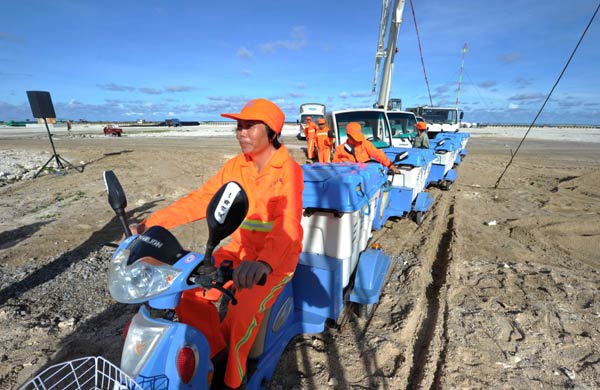Mayor: Sansha should have marine rescue base
By Wang Qian and Wu Jiao (China Daily) Updated: 2014-03-11 07:31|
Workers assist in the operation of a wastewater treatment plant on Yongxing Island. Xiao Jie, mayor of Sansha, made a proposal to establish a rescue base to deal with offshore emergencies, which often involve fishermen. Zhao Yingquan / Xinhua |
Xiao Jie, who is a deputy to the National People's Congress, said on Friday that the base should be built on Jinqing Island or Yongxing Island, with parking aprons constructed on nearby islands.
The facility should be equipped with rescue vessels and helicopters and coordinate with maritime law enforcement units and the military, Xiao said.
Xiao's proposal is set to be highlighted as the ongoing search for a missing Boeing 777-200 aircraft has showed how important it is to have important rescue facilities in the South China Sea. A joint search effort from 10 countries including China, Malaysia, Singapore, the United States and Vietnam have been launched to hunt for the Malaysia Airlines MH370 flight that vanished from radar Saturday morning. It was carrying 239 passengers and crew from 14 countries and regions, including 154 Chinese.
Previous reports said that a 5,000-ton patrol ship will also be deployed to the waters administered by Sansha, the country's youngest city, to conduct regular patrols in the South China Sea.
Every year, tens of thousands of Chinese fishermen head to the South China Sea, and many get caught in dangerous weather conditions, particularly during the typhoon season.
"The base is urgently needed for these fishermen," Xiao said.
Last year's typhoon season was a bad one, with six strong storms hitting Sansha from September to October, destroying hundreds of houses and sinking dozens of ships.
Starting in late September, Typhoon Wutip sank three boats off Guangdong, with 14 killed and 48 missing. Rescuers were only able to bring 26 home alive.
During the rescue mission, Sansha conducted 150 voyages and 94 flights, rescuing 14 fishermen and taking eight of the injured to hospitals.
Although the rescue mission was hailed by both fishermen and authorities, Xiao said if the ships had been deployed closer to the area, the operation would have saved more lives.
"The base will serve as a rescue command headquarters, which can coordinate with the islands nearby," Xiao said.
He added that "a speedy, orderly and effective emergency response and rescue system" can also be set up to deal with sudden incidents at sea.
Yin Zhuo, director of the Chinese Navy Information Expert Committee and a CPPCC member, agreed that rescue capabilities in the area need to be enhanced.
"The South China Sea is the busiest area of water for offshore transportation, while the search-and-rescue capabilities are quite weak, lacking infrastructure facilities such as harbors and airports," said Yin, who is also a member of the National Committee of the Chinese People's Political Consultative Conference.
He added that Yongshu Reef in the southerly Nansha Islands could also be used for marine search-and-rescue operations.
Besides search and rescue activities, offshore law enforcement patrols in the waters surrounding Sansha have also been intensified in the past year.
According to the Sansha government, the city has already established a joint military-civilian defense coordination center on the Xisha Islands to patrol the nearby waters.
In 2013, the center conducted 83 maritime law enforcement missions at sea, sailing 13,565 nautical miles (25,122 km) in total.
Contact the writers at wangqian@chinadaily.com.cn and wujiao@chinadaily.com.cn
- 'Cooperation is complementary'
- Worldwide manhunt nets 50th fugitive
- China-Japan meet seeks cooperation
- Agency ensuring natural gas supply
- Global manhunt sees China catch its 50th fugitive
- Call for 'Red Boat Spirit' a noble goal, official says
- China 'open to world' of foreign talent
- Free trade studies agreed on as Li meets with Canadian PM Trudeau
- Emojis on austerity rules from top anti-graft authority go viral
- Xi: All aboard internet express








